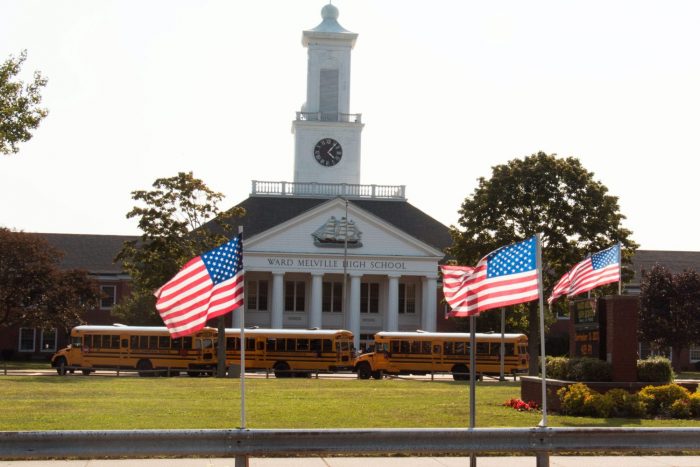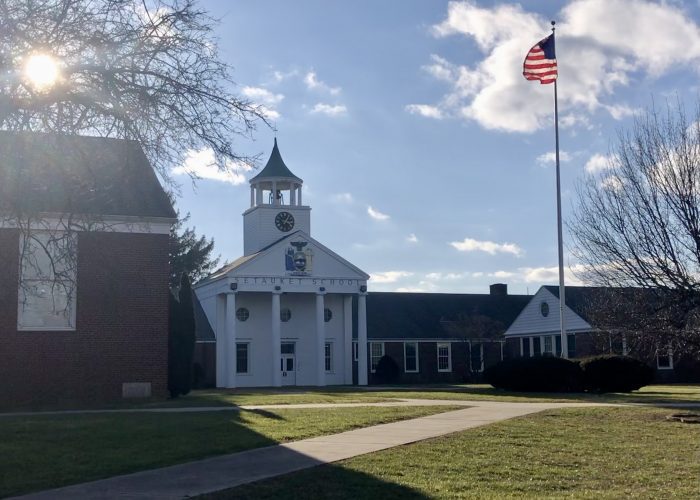By Mallie Jane Kim
Three Village Central School District is attempting more advanced budget planning, but that may be easier said than done. Discussions at the May 8 Board of Education budget hearing highlighted the complications and uncertainties districts face in trying to look ahead.
After a presentation of the $236.1 million district budget for 2024-25, which is up for vote on May 21, the board returned to the recent hot topic of building out a five-year budget plan. Superintendent of Schools Kevin Scanlon indicated that he gave trustees a document looking forward to upcoming district needs considering state mandates likely coming down the pike, including electrification of school buses, mandatory universal pre-K and 3-year-old pre-K.
But projecting finances is another matter.
“There’s factors that, like this year, it’s a gamble,” Scanlon said, referring to the threat earlier in the spring of losing $9 million in state aid funds that did not happen.
Other uncertainties include fluctuating costs in vital areas like health insurance, security and transportation, changes in salaries negotiated every few years and the new unreliability of state aid.
Trustee Karen Roughley, one of the board members who has pushed for advanced planning, noted that any such plan would be something of a guess.
“We need to understand what the financial impact is, but we also need to understand that that’s going to be generalizations,” Roughley said. “You’re never going to get down to the dollar on what our budget is going to look like, but we can have an idea of what we want to do.”
Even planning year to year has challenges, for instance, special education or English language learning services could arise at any time, as Deputy Superintendent Jeffrey Carlson noted.
“We always know there’s going to be additional needs that we don’t even know yet,” Carlson said, noting that if a family moves into the district with needs, those services are mandated. “We can’t say, ‘Well, sorry we don’t have the money budgeted.’ We have to find the money in the budget for that.”
Scanlon added that for 2024-25 school year, the district already knows of 37 students, which he said is more than 10% of the incoming kindergarten class, who will be in self-contained special education classes this fall.
Extrapolating all of that out to plan five years ahead brings in even more unknowns. Trustee Shaorui Li pointed to the fact that the tax cap changes each year, based on a state formula that doesn’t always reflect inflation accurately.
“Whenever we have high inflation, I’m sure something is being sacrificed,” she said.
Budget facts
The $236.1 million budget facing voters stays within the state’s mandated 2.84% tax levy increase and therefore requires a simple majority vote to pass.
Carlson noted the budget includes $3 million in capital improvement projects, which will fund adjustments to the high school to accommodate adding ninth grade in 2025. Other capital projects on the docket include bathroom renovations and ongoing asbestos abatement. New York State reimburses the district for 66% of these capital improvement costs over time, according to Carlson.
He added that he expects a large number of retirements over the next few years, something that, brain drain aside, saves the district money. According to district data, this year’s number of retirements is up to 75, including 33 teachers and five administrators, and about 131 employees are coming up on their first retirement eligibility.
“It would create tremendous financial opportunities for the district,” Carlson said of future retirements. “Whether that be to add programs, or to simply fund more reserves, start putting money in capital reserves or maybe not increase the tax levy as much, all of those are the opportunities that will be coming.”
Three open board of education seats
Voters will also select three trustees for next year’s school board. At a PTA Meet the Candidates night, May 9, candidates were asked to share something they wished the budget had accomplished.
Stanley Bak indicated he wished some slice of any extra money found through budget adjustments would go toward decreasing the tax levy, rather than getting absorbed by other areas of the budget. “I would have liked to see some acknowledgement that taxpayers exist within the district,” he said. “Our enrollment has been going down for some time, and our taxes keep going up.”
For Amitava Das, secondary school start times would’ve been his priority. “All the evidence points that school should start later,” he said. “If the budget was the only thing that stopped late start to school being implemented, I wish that weren’t the case, and that we had found the funds to do so.”
Current board member Shaorui Li acknowledged that she, too, is concerned about the budget but pointed out that Three Village is on par or better in per-student spending when compared to Syosset and Jericho school districts, which she called out as other “very good” school districts in the area. Elsewhere in the evening, she emphasized the importance of the variety of programs available for students. “If we keep under the cap, that is OK for us,” she said. “Making it lower will just lose our advantage and standing as a very good school district.”
Susan Rosenzweig, also an incumbent, said she would have preferred rebuilding funds in accounts set aside for a rainy day. “I wish we could have repaid the money we borrowed from ourselves to stay open during COVID, and begun to really build up those reserves,” she said, adding that she believes the state should change regulations to allow districts to build reserves even higher than current limits. “If the state’s allowed to, we should be allowed to, as well.”
The two top candidates will each win three-year full terms, and the candidate who receives the third-most votes will fill the one year remaining on a term left open last year by a board member who had to resign for personal reasons.
Residents can vote Tuesday, May 21, at Ward Melville High School from 6 a.m. through 9 p.m. Early and absentee ballots are also available through the district.






